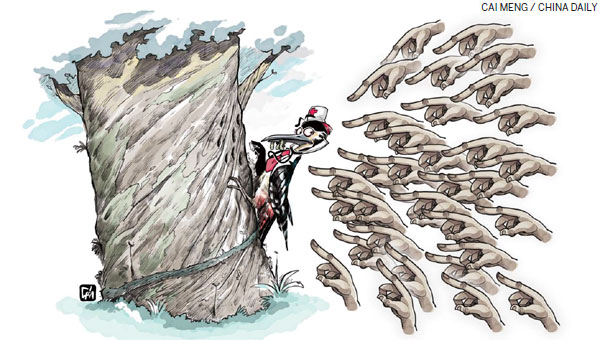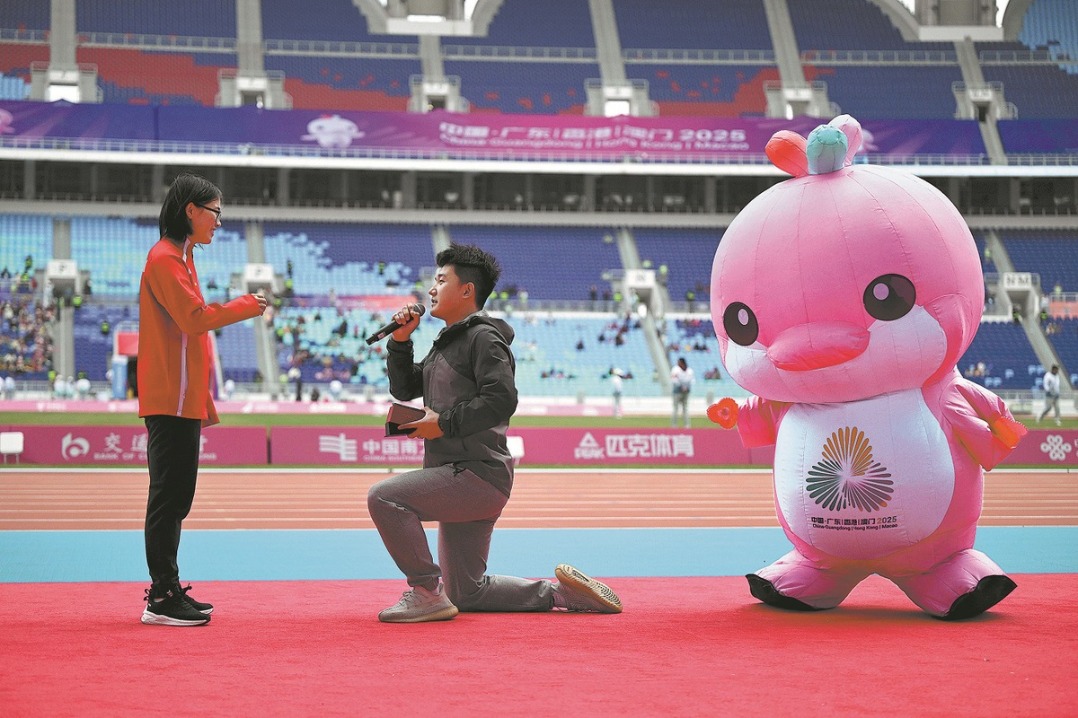What's up with the money, doc?

Doctor's wealth disclosure has raised eyebrows - but aren't these lifesavers worth more?
Ren Liming is a urologist at the Second People's Hospital in Chengdu, Sichuan province. He was thrust into the limelight when he posted a photo of a down jacket he just bought - with an eye-popping price tag of 10,000 yuan ($1,400; 1,324 euros; 1,112).
Some were amazed by his flaunting of personal wealth. They thought people in the healthcare industry should keep a low profile because of the long-standing tension between doctors and patients in China.
Many doctors have been accused of taking cash gifts from patients or their families - to the point that they represent a significant part of their income.

Admittedly, Ren's expensive jacket, together with the revelation that he makes 1 million yuan a year, raised the suspicion that his lavish lifestyle is built on this so-called gray income.
Just as he was supposed to be shedding tears of remorse for his outburst of vanity, Ren came forward and divulged more personal information to a local reporter.
He owns three properties and about one-fifth of his annual income - 200,000 yuan - is from his day job at the hospital, and he spends it on clothing alone.
He derives other income from online consulting and offline teaching, practicing medicine in other places and making healthcare-related investments.
The purpose of "spilling the beans", he says, is to instill pride in young professionals who are just entering the business. He says many of his peers in the top echelon make as much as he does, or even more.
He also addresses the sensitive topic of "gray income", saying that if your legal earnings are high enough, you have no incentive to take bribes.
But I suspect that his real motive is to promote his businesses and his personal name. Now that he is the best-known urologist in the city, requests for consultations will go through the roof, I imagine.
Which is not wrong - just a bit unconventional. Ren may have been exploiting the nation's hate-the-rich mentality for his own good.
China has come full circle from "To get rich is glorious" in the 1980s to "You'd better lie low if you're filthy rich because the whirlwinds of envy will sweep you away".
The internet has magnified the wealth gap, with websites incessantly hyping the lifestyles of the rich and then following up with blanket hatred of that high-profile demographic.
In recent years the voice of reason has spoken up, arguing that the key is not how much wealth one has but how that wealth was accumulated, legally, ethically or otherwise.
A tricky point of debate is the so-called original sin, which refers to the often less-than-upright way the first pot of gold was made - a sin that's said to tarnish many private entrepreneurs.
For years Chen Guangbiao was China's most conspicuous spender. He would stack up a wall of bills and take photos with it. He claimed to be a big philanthropist but has turned out to be a big showman, who used philanthropy as a means to ingratiate himself in circles of power.
I'm not discounting the desperate need for vulgarian excess that characterizes the nouveau riche, but when the flaunting gets too tacky it arouses suspicion that there's more than vanity at work.
Maybe someone of Guo Meimei's age doesn't think twice before posting expensive purchases made possible by a rich sugar daddy, but a mature entrepreneur would probably resist the temptation unless he or she is totally isolated from the internet culture.
Guo almost singlehandedly ruined the reputation of the Red Cross when she gave herself a title affiliated with the organization and posted pictures of luxury items.
I don't know if Ren's comment that many of his peers make as much as he does is accurate.
A few years ago, I went on a trip to Africa with a dozen healthcare professionals who were offering free medical services for treating cataracts. I learned firsthand that most of them did not make as much as Ren.
I did a search and found a 2015 survey on Dxy.cn, a medical information site. It surveyed 30,000 doctors nationwide and concluded that the average annual salary was 77,000 yuan, and 74 percent of the doctors were not satisfied.
If this figure is accurate and can be extrapolated to the whole country, it confirms my impression that doctors in China are far from enviable - not only compared with their counterparts in developed countries but with professionals in other Chinese industries such as finance.
Considering the higher-than-normal investment in education and training, their incomes can be said to be on the lower end of the social spectrum.
The primary reason the incomes of Chinese doctors do not reflect their status or market demand is that the rates for medical services in China are highly regulated. It costs only a couple of yuan to see a doctor, so even if a doctor treats 100 patients a day it does not add up to much. To subsidize the cost of the counseling, hospitals add a heavy markup to prescribed drugs.
These practices are rooted in the good intention of offering a nearly free service to everyone, but they have led to less-than-desirable results.
For example, some people flock to the best hospitals for something as innocuous as a common cold. Meanwhile, both patients and pharmaceutical sales representatives dangle big bribes in front of doctors, which is the market's way of "correcting" the reality of doctors being seriously underpaid.
Whenever there is a complaint against the medical profession, people cite United States doctors as role models. But they tend to forget that US doctors are paid 15 times as much.
It is pretty hard for anyone to keep up a good attitude when 100 patients are squeezed into one shift.
Everyone wants free or nearly free healthcare that is also good quality. Few see the irony in this.
A government should help those in need - the poor who cannot afford expensive medical services. But if it makes healthcare affordable by artificially depressing incomes in the profession, it is tantamount to driving away future talent.
In that sense, Ren has become a lightning rod, even though his solution may not be applicable across the industry.
Contact the writer at raymondzhou@chinadaily.com.cn
(China Daily Africa Weekly 12/16/2016 page22)
Today's Top News
- Xi hears report from Macao SAR chief executive
- Xi hears report from HKSAR chief executive
- UN envoy calls on Japan to retract Taiwan comments
- Innovation to give edge in frontier sectors
- Sanctions on Japan's former senior official announced
- Xi stresses importance of raising minors' moral standards





























